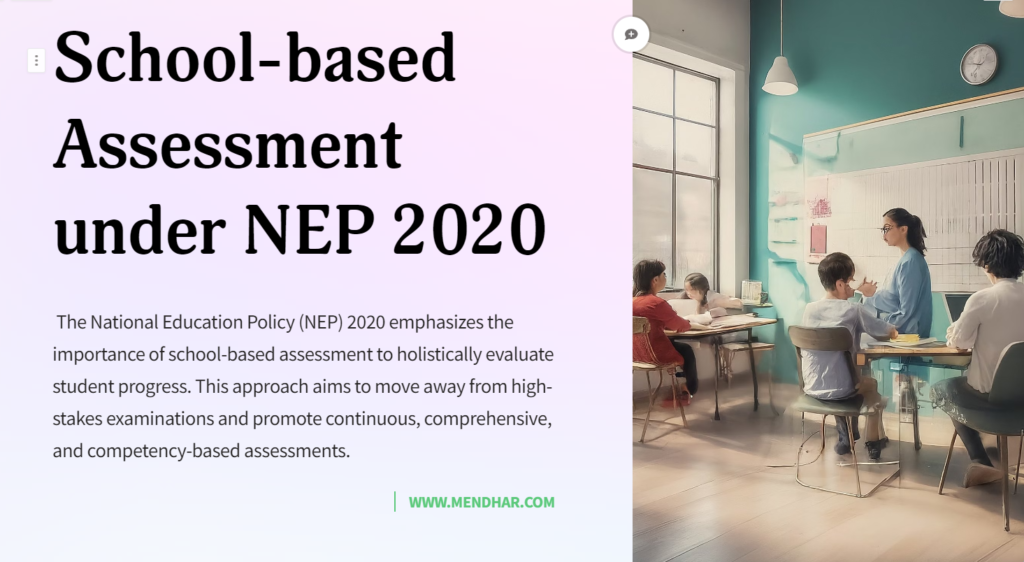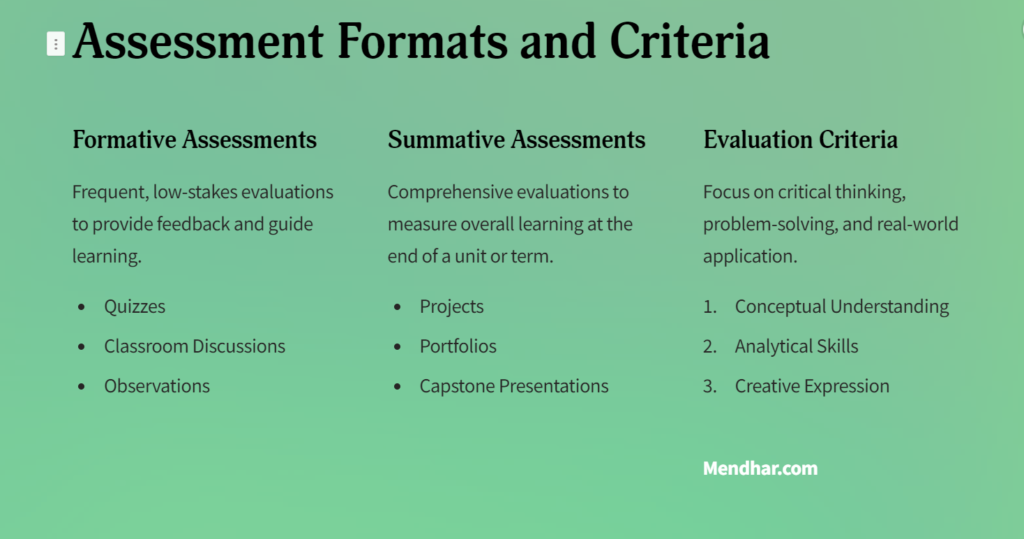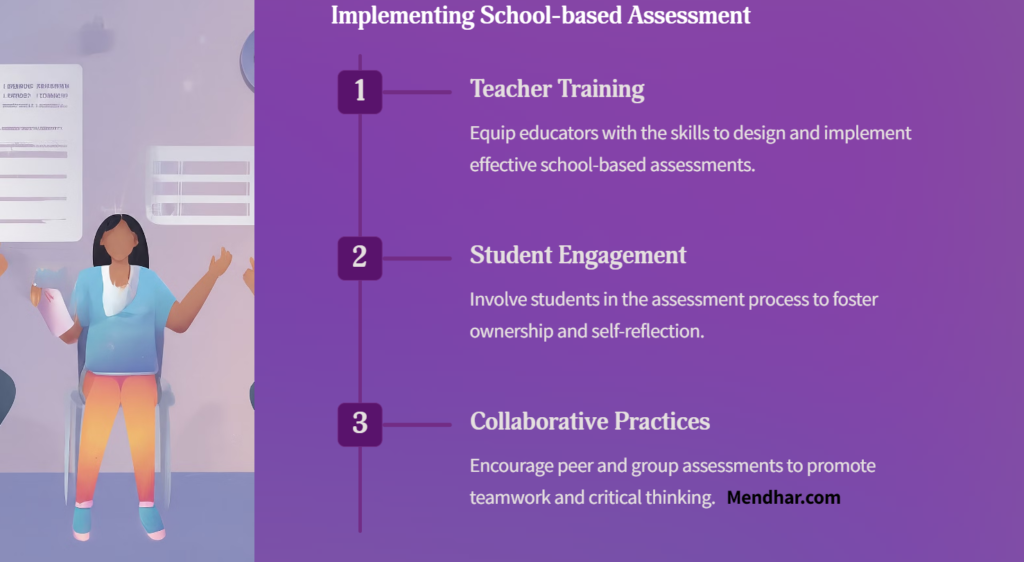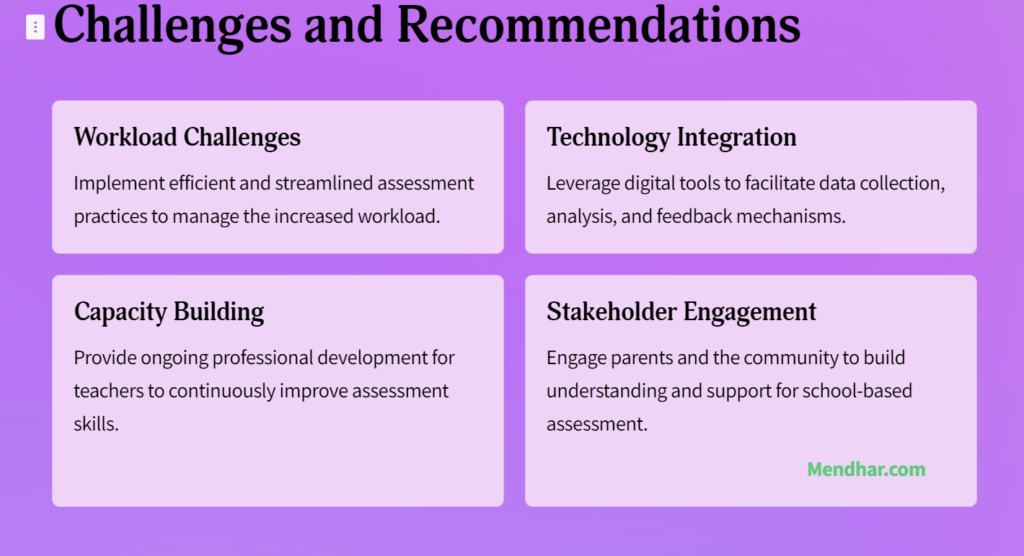Table of Contents
ToggleUnderstanding School-Based Assessment under NEP 2020

Introduction to School Based Assessment:
In the transformative landscape of education, the National Education Policy (NEP) 2020 stands as a beacon of change, emphasizing holistic development and skill enhancement. Central to this shift is the concept of School-Based Assessment (SBA), a methodology designed to nurture individual growth and learning outcomes. Let’s delve into the essence of SBA as per the guidelines of NEP 2020, exploring its significance and implementation strategies.
School-Based Assessment, abbreviated as SBA, is a dynamic evaluation approach that shifts the focus from rote learning to comprehensive understanding. It empowers educators to assess students’ progress continually through diverse methodologies beyond traditional examinations. NEP 2020 advocates for the integration of SBA at all levels of education, fostering a culture of continuous learning and improvement.
Key Features of School-Based Assessment:
| Feature | Description |
|---|---|
| Continuous Evaluation | SBA emphasizes ongoing assessment, providing regular feedback to students, enabling them to track their progress effectively. |
| Diverse Assessment Tools | It encourages the utilization of various assessment methods such as quizzes, projects, presentations, and portfolios. |
| Individualized Learning | SBA caters to individual learning styles and pace, promoting personalized educational experiences for each student. |
| Comprehensive Feedback | Students receive detailed feedback on their strengths and areas needing improvement, facilitating self-reflection and growth. |

Implementation Strategies of School Based Assessment:
Implementing SBA effectively requires a strategic approach aligned with the principles outlined in NEP 2020. Here are some strategies for seamless integration:
Teacher Training: Conduct comprehensive training programs to equip educators with the knowledge and skills required for SBA implementation.
Curriculum Alignment: Ensure alignment between the curriculum and assessment methods, allowing for a cohesive learning experience.
Technology Integration: Utilize educational technology to streamline assessment processes, facilitate data analysis, and provide personalized feedback.
Stakeholder Engagement: Foster collaboration among teachers, students, parents, and policymakers to create a conducive environment for SBA implementation.
Quality Assurance: Establish mechanisms for quality assurance to maintain the integrity and reliability of assessment practices.
Flexibility and Adaptability: Remain flexible to adapt SBA methodologies based on evolving educational needs and feedback from stakeholders.
Monitoring and Evaluation: Regularly monitor the implementation of SBA and evaluate its effectiveness in enhancing learning outcomes.

Benefits of School-Based Assessment:
Holistic Development: SBA promotes holistic development by assessing not only academic performance but also skills, attitudes, and values.
Reduced Exam Stress: By replacing high-stakes examinations with continuous assessment, SBA reduces exam-related stress and anxiety among students.
Real-World Relevance: SBA prepares students for real-world challenges by focusing on practical skills, critical thinking, and problem-solving abilities.
Enhanced Feedback: Detailed feedback provided through SBA enables students to understand their strengths and weaknesses, facilitating targeted improvement.
Parental Involvement: SBA encourages parental involvement in the learning process, fostering a collaborative partnership between home and school.
Conclusion:
School-Based Assessment, as per the guidelines of NEP 2020, heralds a paradigm shift in the educational landscape, emphasizing continuous evaluation, personalized learning, and holistic development. By embracing SBA, educators can unlock the full potential of every student, nurturing a generation equipped with the skills and knowledge to thrive in the 21st century.
Embrace the essence of School-Based Assessment and embark on a journey of transformative education, shaping the future leaders of tomorrow.

Frequently Asked Questions on School-Based Assessment under NEP 2020
1. What is School-Based Assessment (SBA)?
- School-Based Assessment (SBA) is an evaluation approach that emphasizes continuous assessment and feedback within the school environment. It moves away from reliance solely on high-stakes examinations and focuses on diverse assessment methods tailored to individual student needs.
2. How does SBA differ from traditional assessment methods?
- Unlike traditional assessment methods that often rely on standardized tests and exams, SBA incorporates various assessment tools such as projects, presentations, quizzes, and portfolios. It provides a more comprehensive evaluation of students’ learning progress and skills beyond academic performance.
3. What are the key features of SBA as per NEP 2020?
- The key features of SBA under NEP 2020 include continuous evaluation, diverse assessment tools, individualized learning experiences, and comprehensive feedback mechanisms. These features aim to promote holistic development and cater to the diverse needs of students.
4. How is SBA implemented in schools?
- SBA implementation involves aligning the curriculum with assessment methods, providing teacher training, integrating technology for streamlined assessment processes, fostering stakeholder engagement, ensuring quality assurance, and maintaining flexibility to adapt to evolving educational needs.
5. What are the benefits of SBA for students?
- The benefits of SBA for students include reduced exam stress, holistic development, real-world relevance, enhanced feedback, and increased parental involvement in the learning process. SBA enables students to develop critical thinking, problem-solving, and collaboration skills essential for success in the 21st century.
6. How does SBA promote personalized learning?
- SBA promotes personalized learning by catering to individual learning styles, preferences, and pace of students. It allows educators to provide timely feedback and support based on students’ strengths and areas needing improvement, fostering a customized educational experience for each student.
7. What role do parents play in SBA implementation?
- Parents play a crucial role in SBA implementation by actively engaging in their child’s learning journey, supporting their academic endeavors, and collaborating with teachers to monitor progress. Parental involvement strengthens the partnership between home and school, contributing to students’ overall success.
8. How does SBA contribute to the goals of NEP 2020?
- SBA aligns with the goals of NEP 2020 by promoting holistic development, reducing exam-related stress, fostering critical thinking and problem-solving skills, enhancing feedback mechanisms, and encouraging continuous learning and improvement. It serves as a catalyst for transformative education reform in line with NEP 2020’s vision.




